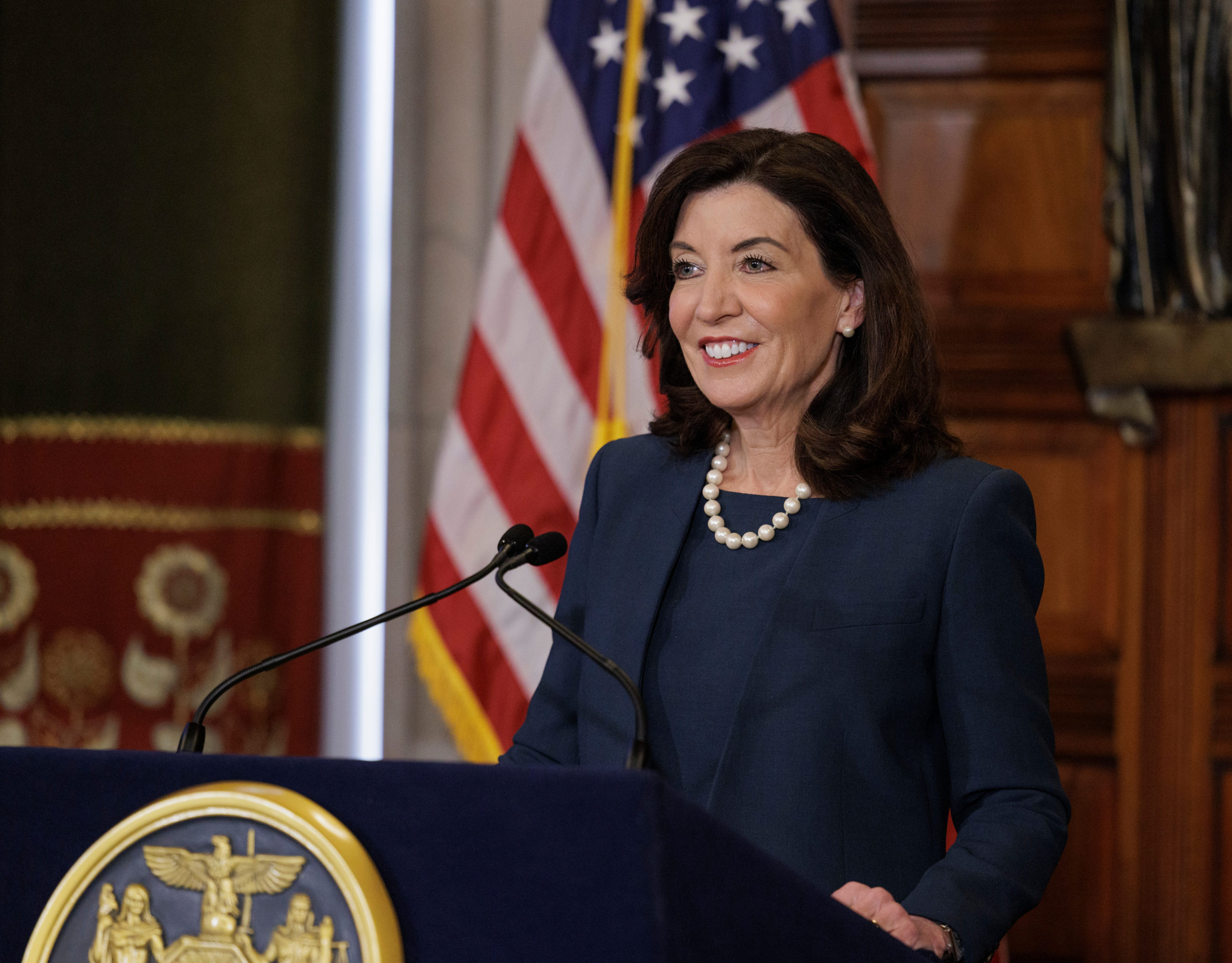


$10 Billion Plan Will Rebuild Healthcare Workforce and Build Healthcare System of the Future
$31 Billion Plan Will Strengthen Teacher Workforce and Invest in Schools
Provides Tax Relief for Small Businesses and the Middle Class
Record Five-Year $32.8 Billion DOT Capital Plan Will Leverage Federal Funding to Support Major Infrastructure Projects Throughout the State
$900 Million in Childcare Stabilization Grants Will Cover Operational Costs for 15,000 Childcare Providers Statewide
$1 Billion to Fund Innovative Small Businesses and Tax Credit for COVID-Related Expenses
Invests $1.5 Billion in SUNY and CUNY Over Next Five Years and Expands TAP Eligibility
Includes $4 Billion for Clean Water, Clean Air, and Green Jobs Environmental Bond Act and $500 Million for Offshore Wind
Launches a New Five-Year, $25 Billion Comprehensive Housing Plan
$224 Million to Fund Law Enforcement and Community-Based Gun Violence Initiatives
FY 2023 Budget Book Available Here
Governor Kathy Hochul today, with Division of the Budget Director Robert F. Mujica Jr., outlined her Fiscal Year (FY) 2023 Executive Budget. The FY 2023 Executive Budget maintains the Governor’s commitment to passing a bold agenda that by rebuilds New York’s healthcare and teacher workforces; provides tax relief to those who need it most; speeds up economic growth and creates good-paying middle-class jobs; strengthens the state’s infrastructure and confronts climate change; secures public safety and protects communities; makes housing more affordable to ensure every New Yorker has a roof over their head; and enacts bold reforms to restore trust in State government.
“We have the means to immediately respond to the COVID-19 pandemic as well as embrace this once-in-a-generation opportunity for the future with a historic level of funding that is both socially responsible and fiscally prudent,” Governor Hochul said. “As I said in my State of the State speech: It’s time for a better, fairer, and more inclusive version of the American Dream. I’m calling it the New York Dream. We will make that New York Dream real – and ensure that it can be realized by every single New Yorker.”
“Governor Hochul’s Executive Budget makes historic investments in critical areas while ensuring that we are equipped for future shocks,” Budget Director Robert F. Mujica Jr. said, “Never again will the State find itself unprepared for the opportunities – or challenges – ahead. After years of unprecedented hardship, this Budget makes the State, from a financial perspective, as resilient as its spirit. It is the Budget that New Yorkers deserve and expect.”
A Balanced Budget
Governor Hochul’s FY 2023 budget proposal reflects New York’s solid financial footing. As tax revenues rebound the budget is balanced for the entirety of the financial plan leading up to FY 2027, has no budget gaps, and holds spending growth in FY 2023 below inflation.
Rebuilding the Health Care Workforce
To restore our depleted healthcare workforce and build the healthcare system of tomorrow, Governor Hochul will make a more-than-$10 billion, multi-year investment in healthcare, including more than $4 billion to support wages and bonuses for healthcare workers. Key components of this multi-year investment include:
With these investments, Governor Hochul proposes to rebuild and grow the healthcare workforce by 20 percent over the next five years with a program designed to strengthen home care, improve the career pipeline, expand access to healthcare training and education, and recruit healthcare and direct support professionals to care for people in underserved areas.
Strengthening the Teacher Workforce
School Aid: The FY 2023 Executive Budget provides $31.3 billion in total School Aid for SY 2023, the highest level of State aid ever. This investment represents a year-to-year increase of $2.1 billion (7.1 percent) compared to School Year (SY) 2022, including a $1.6 billion Foundation Aid increase and a $466 million increase in all other School Aid programs.
Foundation Aid: Foundation Aid is the State’s main education operating aid formula. It is focused on allocating State funds equitably to all school districts, especially high-need districts, based on student need, community wealth, and regional cost differences. The Executive Budget provides a $1.6 billion (8.1 percent) increase in Foundation Aid, supporting the second year of the three-year phase-in of full funding of the current Foundation Aid formula and ensuring each school district receives a minimum year-to-year increase of 3 percent.
The Executive Budget provides SUNY and CUNY with $106 million – $53 million each – to hire additional full-time faculty at both four-year colleges and community colleges. This investment will fund an estimated 880 additional full-time faculty – 340 at SUNY and 540 at CUNY, including support for CUNY’s plan to convert adjuncts to full-time faculty.
Providing Tax Relief to Those Who Need It
Accelerate the Implementation of the Middle-Class Tax Cut: The eight-year phase-in of personal income tax cuts for middle-class taxpayers first began in Tax Year 2018 and is currently scheduled to be completed at the start of the 2025 Tax Year. The Executive Budget:
Create a Tax Credit for Small Businesses’ COVID-19-Related Expenses: To continue the State’s support for our small businesses, the Executive Budget includes a new capped refundable tax relief program targeting COVID-19-related expenses for small businesses. The program provides:
Provide Small Business Tax Relief: Small businesses were hit particularly hard by the pandemic downturn. The Executive Budget provides much needed tax relief to these businesses by:
Provide a Homeowner Tax Rebate Credit: The Executive Budget creates a new property tax relief credit, the Homeowner Tax Rebate Credit, to eligible low- and middle-income households, as well as eligible senior households:
Capital Plan and Infrastructure
The new five-year, $32.8 billion DOT capital plan will leverage Federal funding commitments made in the Infrastructure Investment and Jobs Act to support final phases of major infrastructure projects, including Hunts Point Interstate Access Improvement and the replacement of I-81 in Syracuse.
The new plan also supports new large-scale projects, including: modernizing the Livingston Avenue Bridge in Albany; reconnecting neighborhoods across the Kensington Expressway in Buffalo; converting Route 17 to I-86 in Orange and Sullivan Counties; and assessing ways to improve road capacity at the Oakdale Merge in Suffolk County.
The Five-Year DOT Capital Plan also increases the existing BRIDGE-NY program by $1 billion, adds a new $1 billion Operation Pave Our Potholes program, and continues record commitments to funding local highway and bridge programs through the Consolidated Highway Improvement Program (CHIPS).
Child Care
Building on $832 million in existing subsidies and $2.3 billion in Federal child care resources, the Budget includes new investments to support children, parents, and the child care industry.
Small Businesses
Governor Hochul is proposing a nearly billion-dollar plan focused on the State’s small businesses, including targeted programs to address small business needs and ensure all types of small businesses prosper throughout the State. Key components of this plan include:
SUNY and CUNY
$1.5 Billion for SUNY and CUNY: The Executive Budget will invest more than $300 million in SUNY and CUNY operations each year over the next five years. Governor Hochul also will partner over the next year with SUNY, its individual institutions, and key stakeholders to develop a plan to implement her vision to transform SUNY into the top statewide system of public higher education in the country. The Executive Budget will help start this transformation with funding for new engineering buildings to help the University at Buffalo and Stony Brook University become SUNY’s flagship institutions.
The Executive Budget will increase operating support to SUNY State-operated campuses and City University of New York (CUNY) senior colleges by fully reimbursing colleges for the $108.4 million cost of “Tuition Assistance Program (TAP) Gap” tuition credits, providing additional State support of $59.6 million to CUNY and $48.8 million to SUNY. The university systems will also receive an $18.6 million in additional operating revenue from Executive Budget legislation to raise the amount of State support that campuses receive for Excelsior Scholarship recipients, increasing operating support by $13.7 million to SUNY State operated campuses, $2.8 million to CUNY senior colleges and $2.1 million to community colleges.
Expand Part-Time Students’ Access to TAP: The Executive Budget includes $150 million to expand TAP, which currently is largely unavailable for students studying part time, to cover students enrolled in six or more credits of study at a SUNY, CUNY, or not-for-profit independent college – an investment estimated to provide support to 75,000 additional New York students annually.
Energy and the Environment
Clean Water, Clean Air, and Green Jobs Environmental Bond Act: The Executive Budget includes $4 billion for the landmark Clean Water, Clean Air, and Green Jobs Environmental Bond Act. This historic initiative will provide the support New York needs to restore critical environmental habitats; reduce flood risks; conserve additional lands and open spaces; protect and improve our water resources; and invest in climate change mitigation projects that will reduce pollution and lower carbon emissions. The Bond Act will also support a substantial investment in the Clean Green Schools initiative that will reach every public school located in a disadvantaged community.
Offshore Wind: The Executive Budget includes $500 million investment to develop the State’s offshore wind supply chains and port infrastructure. This nation-leading initiative will create 2,000 jobs in a growing industry, while helping to make New York the offshore wind capital of the country for years to come.
Housing
Launch a New Five-Year, $25 Billion Comprehensive Housing Plan. The Executive Budget advances a new $25 billion, five-year Housing Plan to create and preserve 100,000 affordable homes, including 10,000 homes with support services for vulnerable populations, and electrify an additional 50,000 homes as part of the State’s plan to electrify one million homes and make another one million electrification-ready. Funding includes $5.7 billion in capital resources, $8.8 billion in State and Federal tax credits and other federal allocations, $11 billion to support the operation of shelters and supportive housing units and to provide rental subsidies.
Combating Gun Violence
The Executive Budget includes $224 million to fund initiatives that will strengthen the gun violence prevention efforts of law enforcement and community-based organizations. Through these actions, we will work to restore New Yorkers’ sense of safety and community. Some of these actions include:
Addressing Addiction and the Opioid Crisis
Under Governor Hochul’s leadership, the Office of Addiction Services and Supports (OASAS) will take significant steps to address the opioid crisis by improving access to addiction treatment services, removing barriers to treatment, developing new and innovative treatment models, and expanding the number of treatment facilities in communities around New York State.
The Executive Budget provides an increase of $402 million (56 percent) in operating and capital support for OASAS to enhance prevention, treatment and recovery programs targeted toward addiction services, residential service opportunities, and primary prevention activities consistent with state opioid settlement agreements; and invests more than $100 million in new resources from the Opioid Stewardship Tax and litigation settlements with pharmaceutical manufacturers and distributors. Of these funds, $113 million will pass through the State to local municipalities, consistent with settlement agreements.
Additional news available at www.governor.ny.gov
New York State | Executive Chamber | press.office@exec.ny.gov | 518.474.8418